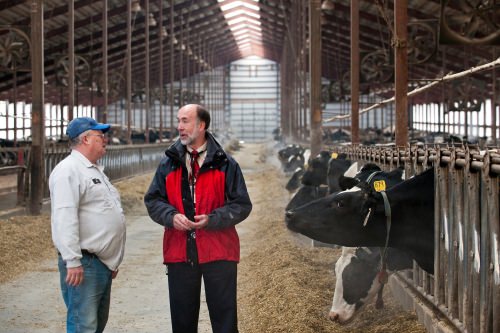Medical students join program to get more physicians into rural Wisconsin
The goal of the Wisconsin Academy for Rural Medicine is to admit students who intend to practice rural medicine, and ultimately help increase the number of physicians in rural Wisconsin. Video: UW School of Medicine and Public Health
Twenty-six students from Wisconsin and Illinois have earned spots in the University of Wisconsin–Madison’s Wisconsin Academy for Rural Medicine, where they will spend time in Green Bay, La Crosse, Marshfield, and surrounding communities training to become physicians in rural areas of the state.
The program, known as WARM, is part of the curriculum at the UW School of Medicine and Public Health. It is a nationally recognized initiative that prepares and supports students who intend to practice in rural Wisconsin and help improve the health of those communities.

WARM Director Byron Crouse (right) visits a dairy farmer in rural Belleville to discuss health care in 2008.
“The Wisconsin Academy for Rural Medicine is an exemplary example of how the School of Medicine and Public Health fulfills the principle of the Wisconsin Idea,” says Byron Crouse, associate dean for rural and community health, and WARM director.
The program was created due to the shortage of physicians in rural Wisconsin. In fact, while 29 percent of Wisconsin residents live in rural locations, only 13 percent of physicians in Wisconsin have rural practices.
Each year, the program admits 26 students. The 2017 class includes a large contingent of students from Wisconsin, and also is represented by one student from Illinois.
In the rural medicine program, students complete their first 18 months of medical school in Madison at the School of Medicine and Public Health. Students will spend the remaining years of medical school at Aurora BayCare in Green Bay, Gundersen Health System in La Crosse and Marshfield Clinic in Marshfield, along with their networks of rural hospitals and clinics.
Students also participate in regular core days at their sites to focus on a specific topic from a rural perspective and complete a community health project.
Students complete their first 18 months of medical school in Madison, then finish their training in Green Bay, La Crosse, Marshfield and surrounding rural communities.
Past project topics have included farm-to-table programs, concussion awareness for young athletes, rural drug and alcohol abuse, health literacy and community disaster drills.
Opportunities also exist for students to do electives at sites away from Madison and to pursue global health opportunities as well as complete the Master of Public Health Program or the Path of Distinction in Public Health at the UW.
Admission is limited to applicants who are legal residents of Wisconsin, Michigan, Minnesota, Illinois or Iowa. To date, more than 120 students have graduated from the program, and 92 percent of those graduating from residencies are practicing in Wisconsin.
“Working with partners throughout the whole state of Wisconsin, WARM is preparing physicians to meet the needs of the residents in rural Wisconsin and help to eliminate rural health disparities. We are proud that 92 percent of our WARM graduates are practicing in Wisconsin and just under one-third have returned to their hometowns,” Crouse says.
Subscribe to Wisconsin Ideas
Want more stories of the Wisconsin Idea in action? Sign-up for our monthly e-newsletter highlighting how Badgers are taking their education and research beyond the boundaries of the classroom to improve lives.
Tags: health care, rural, students, The Wisconsin Idea
